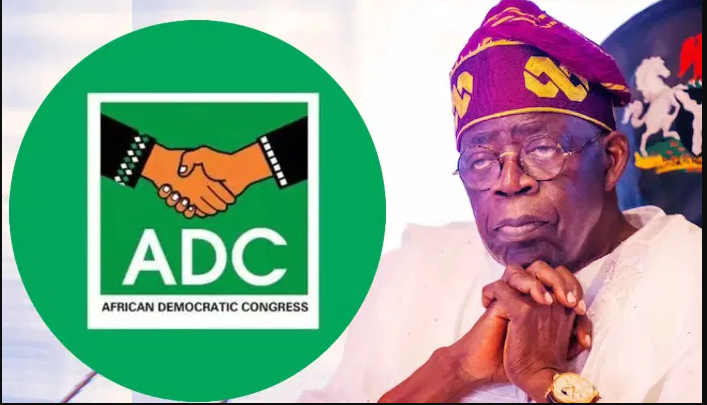1.2K
By Myke Agunwa, Abuja
The African Democratic Congress (ADC) has condemned President Bola Tinubu’s decision to grant presidential pardons to several convicted drug traffickers, killers and smugglers, describing the move as “pathetic, irresponsible, and a national disgrace.”
The President had on Wednesday, October 8, 2025, evoked his powers on Prerogative of Mercy and granted amnesty to some convicted persons.
The Presidential Advisory Committee on Prerogative of Mercy (PACPM), chaired by the Minister of Justice and Attorney-General of the Federation, conducted nationwide assessments of prisoners situation in collaboration with the Nigerian Correctional Service (NCoS). It evaluated cases based on criteria such as age, health condition, remorse, duration served, good conduct, likelihood of reintegration into society and recommended that about 175 inmates should be granted Presidential pardon.
Among the beneficiaries were Maryam Sanda, sentenced to death in 2020 for killing her husband, Bilyaminu Bello, but was let off the hook after serving about six years due to reported remorse and good conduct.
Also pardoned was Hon. Farouk Lawan a former House of Representatives member convicted in 2021 for receiving a $500,000 bribe from oil magnate Femi Otedola.
Other beneficiaries included multiple drug offenders such as Nweke Francis Chibueze, Kelvin Christopher Smith, and Azubuike Jeremiah Emeka, all jailed for cocaine and tramadol-related offences including Dr. Nwogu Peters and Ayinla Saadu Alanamu convicted for fraud and bribery.
In a strongly worded statement signed by the party’s National Publicity Secretary, Mallam Bolaji Abdullahi on Sunday, the ADC warned that the action undermines Nigeria’s anti-drug campaign, encourages criminality, supports homicide and further damages the country’s global reputation.
“The African Democratic Congress (ADC) finds as pathetic and an act of immense national disgrace the recent presidential pardon and clemency granted to several convicted criminals by President Bola Ahmed Tinubu,” the statement read.
The party said it viewed the decision as an abuse of the presidential prerogative of mercy, stressing that the beneficiaries of the pardon include individuals convicted of grave offences such as drug trafficking, smuggling, and gun running — crimes that attract some of the most severe penalties in Nigerian law.
According to the ADC, it is “a most irresponsible act” to release such offenders after barely two years in prison for crimes that carry life sentences. The party faulted what it described as the administration’s misplaced sense of compassion, which, according to official explanations, was based on the convicts’ supposed remorse and participation in prison skill acquisition programmes.
“From what we have seen, it appears that all it takes to get presidential clemency in Nigeria, even for the worst crimes, is to ‘show remorse’ and ‘learn skills. We wonder what Nigeria stands to gain from granting clemency to convicts serving life sentences who have barely served two years” the coalition party stated.
The ADC lamented that Tinubu’s action disregards the enormous sacrifices of security agencies such as the National Drug Law Enforcement Agency (NDLEA), whose personnel have risked their lives combating the drug menace, dismantling criminal networks, and securing convictions in courts.
“For years, the NDLEA and other security agencies have risked life and limb to combat this problem, dismantle illicit drug networks, intercept consignments, prosecute offenders, and secure convictions. To grant clemency to individuals convicted under such laws strikes at the very foundation of Nigeria’s moral and legal stance against narcotics” Abdullahi said.
The party noted that Nigeria remains a major transit route for international drug cartels and faces a worsening internal drug crisis. It cited reports estimating the prevalence of drug use in Nigeria at 14.4 percent nearly three times the global average of 5.5 percent warning that the presidential clemency sends a dangerous message at a time when the country should be strengthening, not weakening, enforcement.
“These pardons make a mockery of the gallant efforts of the men and women who have laboured under enormous pressure to protect the public from the scourge of addiction, trafficking, and related crimes,” the party stated.
The ADC further warned that the decision could harm Nigeria’s international partnerships in the global fight against narcotics. It said the move could reinforce negative perceptions about the country’s commitment to law enforcement and potentially signal to global drug cartels that Nigeria is becoming a “risk-free jurisdiction” for their operations.
“These pardons undercut our standing among global partners in the fight against drug trafficking and give the unfortunate impression that Nigeria, under President Tinubu, has particular sympathy for drug dealers,” the statement said.
The opposition party accused the ruling All Progressives Congress (APC) of eroding national values and moral standards, saying Tinubu’s decision reflects the administration’s disregard for accountability and justice.
“With this mass clemency for drug dealers, President Tinubu and the APC are redefining the standard of morality in our country,” the ADC declared. “They are gradually transforming Nigeria into a nation where anything goes, where even the worst crimes attract no punishment beyond a few months of inconvenience for the criminal to, by their assessment, ‘show remorse.’”
Reaffirming its commitment to “rescue the nation from misrule,” the ADC vowed to continue speaking out against what it termed the APC government’s abuse of power and moral decay.
“The mission of the African Democratic Congress remains clear — to rescue our country from this ruling party that has lost its moral compass,” Abdullahi said. “To them, public opinion means nothing, accountability means nothing, and power and impunity mean everything.”
As of the time of filing this report, the Presidency had yet to respond to the ADC’s statement. However, the issue has sparked widespread criticism from civil society groups and analysts who argue that the pardons undermine the credibility of the administration’s anti-crime and anti-drug efforts.



